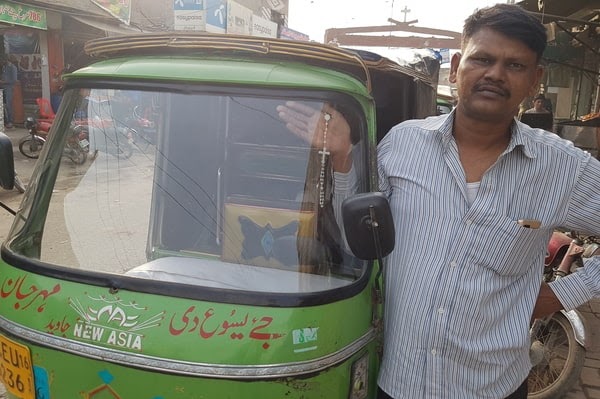As an expression of their courageous faith, Christian rickshaw drivers are proclaiming their faith on public roads in the Islamic Republic of Pakistan.
Most of them can be identified by Bible verses painted on the vehicle, rosaries hanging from the rearview mirror and stickers of the Holy Family.
Article 20 of Pakistan’s constitution guarantees freedom to every citizen to profess, practice and propagate his religion. However, recently two Christians were charged with blasphemy for preaching the Gospel to young Muslims in a Lahore park. Javed Masih, a Catholic rickshaw driver, told Aid to the Church in Need (ACN) about his faith commitment and the challenges he faces on city streets.
“I purchased the three-wheeler auto-rickshaw in 2016 to facilitate my family’s travelling and especially for going to Mass. I have four children, aged 13 to 21. They are growing up fast. We couldn’t ride bicycles together anymore.
“The slogan ‘Jay Yesu di’ (Praise be Jesus) was painted in red on the front the very next day. Other decorations included four stickers of Jesus and Mary pasted on the windshield.
My rosary hangs from the rearview mirror. Instead of going back home from the showroom, I headed straight to St. John’s Catholic Church in Youhanabad for the blessing of the new vehicle. We celebrated that night by eating at a roadside barbecue.
Christian rickshaws are a common sight in Christian neighborhoods and Church compounds. It is of great help to poor Christians who cannot afford cars. Most of them use it personally only for their families.
“It saves our dignity”, says Masih.
“I had been working in the Defense Housing Authority (DHA), a posh neighborhood in Lahore, for more than a decade as a sanitary worker. It is hard to afford living in Lahore with the monthly income of 35,000 rupee ($223) The additional income from the rickshaw (about 1,000 rupees a day) helps in managing day-to-day needs in the face of increasing inflation.
“After finishing my work at DHA at 5pm, I maneuver through the streets in search of customers and return home at 11pm. Driving becomes a full-time job on Sunday, the day off from DHA. Sometimes the Muslims commuters ask about the statement emblazoned on my rickshaw. I simply reply that it is our verse. A few of them refuse to hire my services upon discovering that I am a kafir (infidel). They avoid dealing with our kind.
“We don’t get disheartened or argue in such cases. Our parents have taught us to be silent when it comes to discourse of religion. Poor Christians cannot face mobs or expensive and lengthy court cases. Our police and lawyers are known for siding with the rich and minting money.
But I will never remove the name of Jesus at any cost.
“Most of the Muslim rickshaw drivers display the names of Allah and Prophet Muhammad as well as images of Islamic swords. We use our right to express our faith as well. I try to help Christian passengers by making sure they reach their destination, even if sometimes the extra distance is not covered by the fare. I usually recognize them by the Christian names of their family members. English names in our Muslim society are a testimony as well.
“Rickshaw driving is a livelihood that depends on chance. Sometimes you roam around for three hours without a passenger. Other times you get more than two in an hour. God provides them.
“Sometimes the rickshaw drivers passing by will wave and yell out the slogan ‘Jay Yesu di’ after seeing the one inscribed on my rickshaw. Realizing they are Christians, I find the courage to reply ‘Har shy Yesu di’ (Everything in Christ).”





